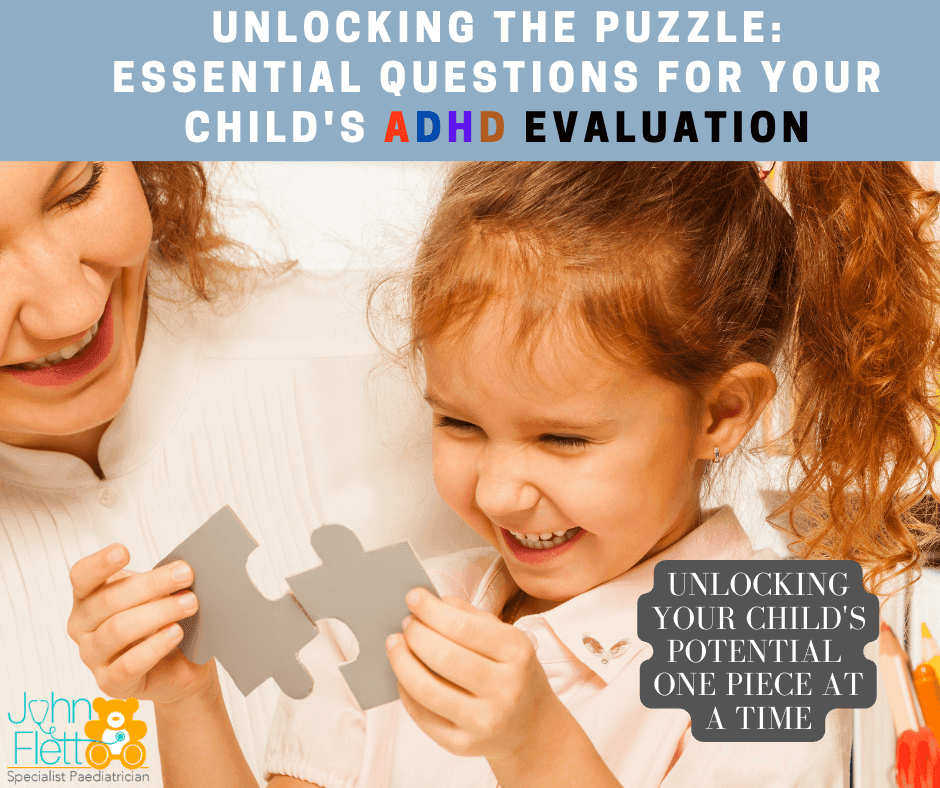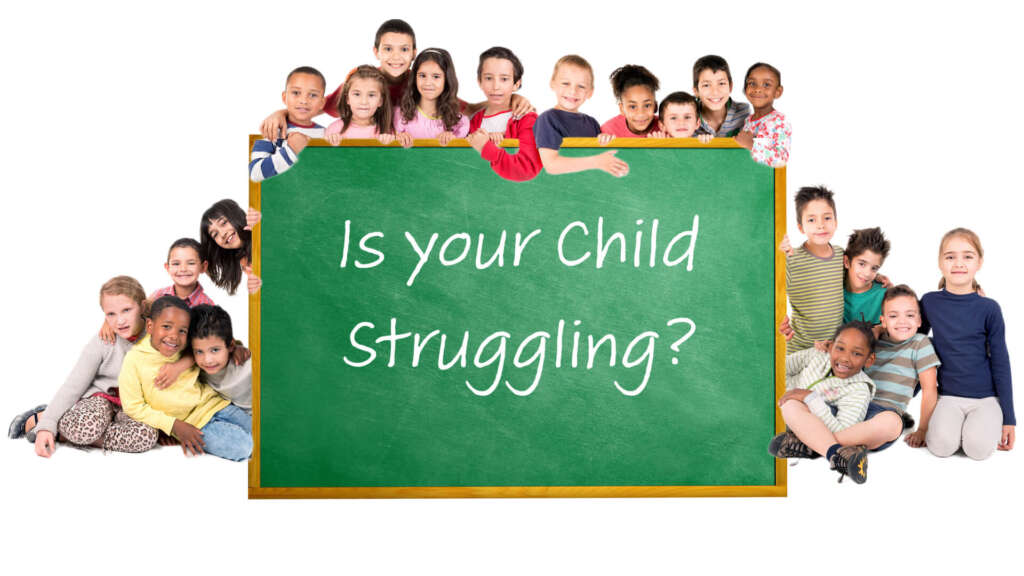Questions to Consider Before Your Child’s ADHD Evaluation

Is your child struggling with focus, impulsivity, or behaviours that impact their learning? It’s time to unlock the support they deserve.
Unlocking Your Child’s Potential – One Piece at a Time
Questions to Consider Before Your Child’s ADHD Evaluation
If your child’s school or you suspect that your child may have ADHD, it’s essential to ask yourself some key questions before having them evaluated. This will help you better understand ADHD, your role in the process, and the specialist best suited to carry out a comprehensive paediatric assessment. Each child requires a unique approach tailored to their needs rather than a one-size-fits-all solution.
1. The ADHD Evaluation and Your Role in It
A comprehensive paediatric evaluation demands that parents gather information from teachers, therapists, and other sources related to their child before the appointment. It’s crucial to find a doctor who can thoroughly and holistically assess all aspects of your child’s situation to make the best diagnosis. The more pieces of the puzzle you provide, the more accurate and complete the final diagnosis will be. As a parent, seeking help from an ADHD expert is vital.
During the evaluation, consider these three factors:
a. Be open and honest – as the parent, you have the right to express your thoughts.
b. Ensure the expert understands your perspective on the issues you think your child is facing.
c. Collaborate to understand your child’s problems so that you can create an action plan to provide the right support.
2. What is ADHD, and what are its three core symptoms?
Most parents know that ADHD symptoms include inattention, hyperactivity, and impulsivity. However, it’s essential to understand why children with ADHD can focus on activities they enjoy but struggle with tasks requiring effort. Symptoms alone do not provide a complete understanding of ADHD. During the evaluation, the specialist will help you unlock this understanding.
3. Is ADHD an executive functioning disorder?
Understanding ADHD as an executive functioning disorder is crucial. Executive functions are brain-based skills required for everyday life, including planning, prioritising, organising, thinking ahead, and working towards long-term goals. Every child with ADHD experiences challenges with executive functions. If your child is diagnosed with ADHD, ensure you understand their specific executive function weaknesses. Ask your doctor for recommendations on supporting these skills.
4. How is ADHD diagnosed in children?
Unfortunately, some doctors perform unnecessary tests, such as 24-hour EEGs, blood tests, or brain scans, to address parental concerns. However, ADHD cannot be diagnosed with a single blood test. Instead, it requires spending time collecting information, asking questions, and allowing parents to share their child’s story, as well as their own, since ADHD is a neurogenetic disorder often inherited. A thorough evaluation process, including an extensive pre-appointment information review, ensures that the appointment time is used effectively and helps the expert understand the child’s background.
5. Is it too early to get my child evaluated for ADHD? Should we wait?
If you have any concerns about your child’s ability to regulate attention or impulsivity or if their behaviour is interfering with learning and functioning, it’s essential to have your child evaluated for ADHD without delay.
The American Academy of Pediatrics (AAP) guidelines for diagnosing and treating ADHD in children start at age 4. However, professionals can often detect and diagnose ADHD in children even younger than that.
6. Who should evaluate my child for ADHD?
It is crucial to have an expert conduct a full evaluation. There may be confusion about who should carry out the assessment, but the specialist should be capable of evaluating all relevant information and communicating with both teachers and parents. Psychologists can perform evaluations and plan treatments. It’s important to remember that assessments by educational psychologists are vital, but they do not involve treatment. Additional tests may be necessary, such as IQ tests, blood tests, occupational therapy assessments, or speech assessments. Ensure you consult an expert who can make the right call on what should be done.
7. What is the difference between a school evaluation and a private evaluation?
School assessments often involve evaluating your child’s educational needs, screening for learning problems in language, maths, and handwriting, and may even involve an educational psychologist. However, these assessments do not include a diagnosis of ADHD, screening for anxiety, or addressing medical problems. A private evaluation, on the other hand, can provide a more comprehensive understanding of your child’s condition, including ADHD diagnosis and the identification of any co-occurring issues.
8. What if my child’s school doesn’t think an evaluation is necessary?
This is a common issue; sometimes, teachers may not recognise ADHD in high-performing students. Even the most well-meaning teachers might think, “Your child can’t have ADHD; they’re so smart/focused/well-behaved.” It could be that your child is masking, working extra hard, and experiencing more stress than their peers to perform well in school.
Regardless of the school’s opinion, if you notice atypical behaviour or symptoms resembling ADHD in your child, go ahead and pursue an evaluation. In this case, seek an outside evaluation, starting with your paediatrician. Bottom line: Don’t let any one person determine whether your child gets an ADHD evaluation.
9. Will a diagnosis mean that my child needs ADHD medication?
A diagnosis of ADHD does not necessarily mean your child needs medication like Ritalin. Many parents are hesitant to pursue an ADHD evaluation due to concerns around medication and treatment. If your child is diagnosed with ADHD, you will likely have a conversation about ADHD medication.
Although the topic may be overwhelming, please note that scientific consensus supports ADHD medication as a well-established and effective treatment for children. The AAP recommends medication as a first-line treatment for ADHD in children aged 6 and up, along with behavioural parent training and/or educational interventions.
However, you will need to follow your journey and learning process regarding ADHD medication and other treatment options. There is no universally right answer.
Childhood ADHD Evaluation: Next Steps
At Guide Little Minds ADHD Centre, we offer an Online ADHD Test to help you determine if you or a loved one may have ADHD. We can provide an in-depth ADHD assessment to improve your understanding of the disorder and identify the best treatment method for you and your family. If you would like further guidance and support on managing ADHD, please contact Dr John Flett at 031 1000 474 or via support@courses.drflett.com, courses.drflett.com, drflett.com.
Assessment Appointment Video:
Appointment for an assessment:



Responses